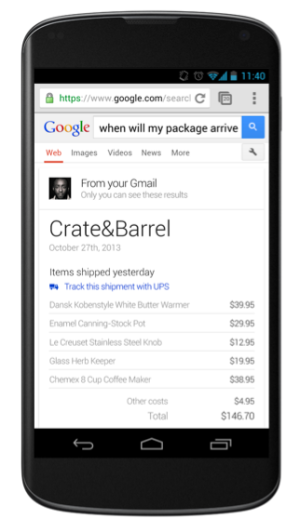Google Brings More “Now” To Search With New Quick Answers
Google is bringing more of the capabilities of Google Now to the search box and providing a range of personalized “quick answers” regardless of platform. These new search capabilities focus on “travel and logistics” use cases: reservations, flights, package tracking and calendar entries, among a few others. The content and capabilities will likely expand over […]

The content and capabilities will likely expand over time. Google’s general objective is to make it easy to get information quickly without having to shift through email or drill down into other Google apps.
Google Now has been delivering much of this information to mobile users for some time. But while Google Now is a “push” model, these new quick answers allow people to find information on demand — and on the PC. That’s consistent with the search “pull” model generally but offered in a more natural language-friendly way.
Users can type or verbally ask queries like:
- “Has my flight from San Francisco been delayed?”
- “What are my plans this weekend?”
- “When will my package arrive?”
For the new quick answers to work, users need to be signed in to their Google accounts (Google allows you to opt out through search settings). The data sources are a blend of personal information from your Google accounts (i.e., Gmail, Calendar) and the web in many instances (e.g., flight or package tracking).
On the Chrome PC and Chrome PC browser users can speak the queries as they would in mobile.
Broadly speaking, these new capabilities start to migrate search toward a more “conversational” style of interaction, which was demonstrated at Google I/O. The practical effect is to push search and Google overall further in the direction of a personal virtual assistant. (Google’s new Moto X handset makes the entire phone into a kind personal assistant with its enhanced Google Now and ambient listening capabilities.)
In becoming more of an “assistant” and more “conversational,” Google distances itself from competitors — as it moves toward its vision of building the “Star Trek computer.” Yet one more interesting dimension of the announcement is that it’s another example of the mobile UX influencing the PC search experience.
The rollout of the new capabilities starts today but will probably take a couple of days to reach all US users.
Opinions expressed in this article are those of the guest author and not necessarily Search Engine Land. Staff authors are listed here.
Related stories